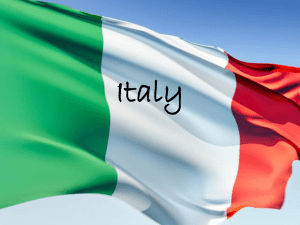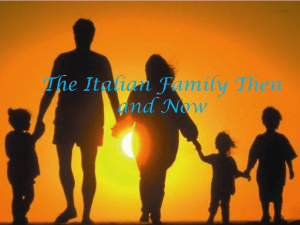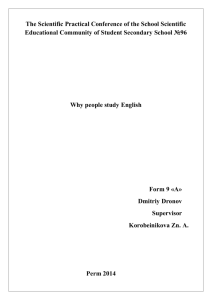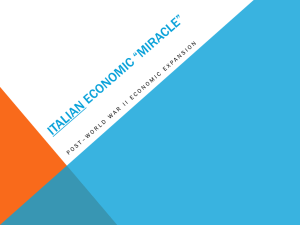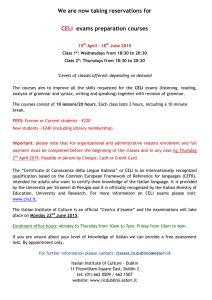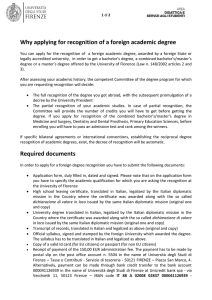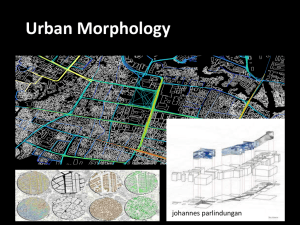Lawrence Lardieri Dr. Rand UWRT 1103 23 September 2014
advertisement
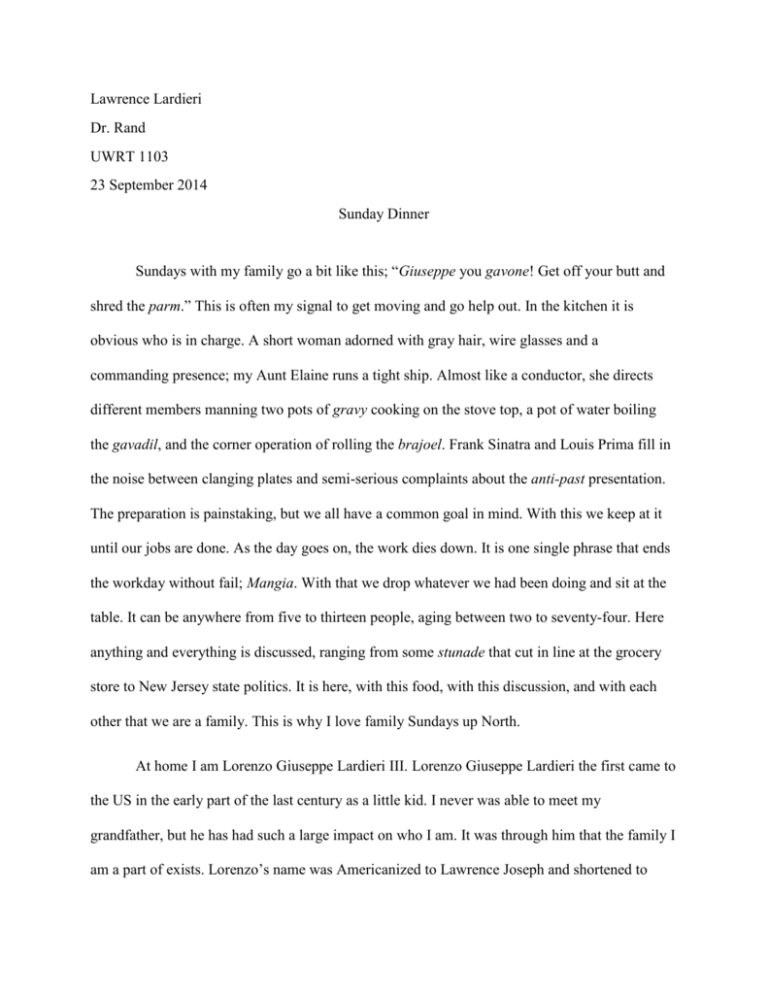
Lawrence Lardieri Dr. Rand UWRT 1103 23 September 2014 Sunday Dinner Sundays with my family go a bit like this; “Giuseppe you gavone! Get off your butt and shred the parm.” This is often my signal to get moving and go help out. In the kitchen it is obvious who is in charge. A short woman adorned with gray hair, wire glasses and a commanding presence; my Aunt Elaine runs a tight ship. Almost like a conductor, she directs different members manning two pots of gravy cooking on the stove top, a pot of water boiling the gavadil, and the corner operation of rolling the brajoel. Frank Sinatra and Louis Prima fill in the noise between clanging plates and semi-serious complaints about the anti-past presentation. The preparation is painstaking, but we all have a common goal in mind. With this we keep at it until our jobs are done. As the day goes on, the work dies down. It is one single phrase that ends the workday without fail; Mangia. With that we drop whatever we had been doing and sit at the table. It can be anywhere from five to thirteen people, aging between two to seventy-four. Here anything and everything is discussed, ranging from some stunade that cut in line at the grocery store to New Jersey state politics. It is here, with this food, with this discussion, and with each other that we are a family. This is why I love family Sundays up North. At home I am Lorenzo Giuseppe Lardieri III. Lorenzo Giuseppe Lardieri the first came to the US in the early part of the last century as a little kid. I never was able to meet my grandfather, but he has had such a large impact on who I am. It was through him that the family I am a part of exists. Lorenzo’s name was Americanized to Lawrence Joseph and shortened to Larry Joe. From my name the strong Italian roots are obvious. A deeper glance shows a cultural struggle to create a new identity, one separate from the Italian one. Noticeable even is the attempt at preservation. An attempt at not only preserving the memory of a man but embodying his culture. The idea of preservation is central to Italian American culture. Preservation of language, preservation of the past, and preservation of family. Food is such a large staple in the Italian American families because it acts like a magnet, attracting people together. Mangia is the force that literally unites the food, magnetic north, and the family, magnetic south. It translates to “you eat.” It is an invitation more so than a command. Mangia brings my family together to eat, to laugh, to love. There is a reason pasta is a staple of Italian American Sunday dinners across the east coast. Pasta is always cooked on Sunday because it keeps for the entire day. Pizza gets soggy, salad doesn’t stay fresh, and sandwiches go stale. On Sundays in Italian American households visitors and family members often drop in unexpectedly. Offering a bowl of pasta is a way to say welcome, sit down, and be a part of the family. It represents the unity portion of the word community. Now perhaps one doesn’t often have visitors on Sundays anymore because the societal culture has changed, but that doesn’t mean you lose that tradition. If anything, it means you try even harder to keep that tradition, to preserve it. When most of the Italians came to the United States, they would live in small communities surrounded by immigrants like themselves. The community helped to make a home in a new and unfamiliar environment. It acted as a network, as a support structure, and as a backbone for people transitioning to life in America. When someone was experiencing difficulty, there was an entire support structure right there to help. Equally when someone did particularly well it was celebrated throughout the community. These celebrations were often very public and full of pride. Many announcements of triumphs and achievements used to show up in local community newspapers and publications. Sadly these announcements are not as prevalent as they once were. My family buys a subscription to one of these, a New Jersey based newspaper called The Italian Tribune. Every month in the Tribune there are stories about the achievements of notable Italians and Italian Americans around the world. These achievements would range from setting up a community arts program to aiding in research of the Higgs-Boson particle. The Tribune was one of the few papers that still reported successes in this way. Each achievement is celebrated not as a feat of the individual, but a triumph of the community itself. I personally came to understand this in the spring of this past year. I had recently been fortunate enough to win a scholarship and word of my achievement spread like wildfire throughout the family. I could tell that their excitement was genuine because for a few days I received call after call expressing incredibly sincere congratulations. I had sort of expected this though, my family has always celebrated our achievements. It wasn’t until I opened The Italian Tribune a couple weeks later that I really knew how real their elation was. After about a minute of skimming I turned a page to see my face underneath the headline “Italian American Wins Prestigious Scholarship.” A short article followed about the nature of the scholarship and a little description of the family that I came from. I was shocked to see myself in the paper. I did not expect that sort of recognition for my achievements. I sat in awe for a couple more minutes before it dawned on me that my Aunt Elaine must have written the article. At first I could not understand why she had done that. Why would she want the rest of the community to know? Sure, as the matriarch of the family she was one of the proudest of my achievement, but she was never the type to brag. It wasn’t until I asked her why she wrote it that I understood. She told me “Giuseppe, when I was your age if someone received such an honor every family in the neighborhood would know. You couldn’t walk to school in the morning without people yelling congratulations at you from across the street. There was unity throughout the neighborhood; this is something we have lost.” We lost that unity for a host of reasons. As time went on the tight knit communities that the immigrants originally lived in spread out. The generation that was from Italy faded with the time as well. In many cases, the traditions that families had practiced seemed to slip between the cracks. These traditions are so important because they are the magnet that pulls people together. As the family matriarch it was my Aunt Elaine’s job to preserve our tradition. She wrote that article because she wanted to bring back a time when the community was as close as it was. She wanted to give me a glimpse of the world she grew up in and was trying to preserve in the hopes I would understand why. I know why she did that. One day I will find myself in her shoes. Maintaining a strong family and community will be even harder than it is today. I believe that that world will be even more disconnected than it already is; the irony of the communication age. I believe that in that world we will need tradition more than ever. In that disconnected world some form of unity with past generations it provides such a unique world view. It provides an explanation of how you came to be where you are. It provides a way to reflect on every single thing that makes you the person you are and with that understanding comes the ability to foresee just maybe where you’re going. I believe tradition is one of the most instinctual human necessities, and partaking in anything less leaves us lost in a very large world. The language that we use and the tradition that we keep are a part of what binds us together as a community. They reinforce my community by existing as common ground between me and the people I love. The strength of that community is so important because it is a support structure in my life. It is something I can always rely on. Having that comfort as a constant is so vital because challenging adversity is very tough on your own. That community was created because it was necessary to the large numbers of Italians that came to the US to face somewhat harsh conditions. The community expanded and strengthened to ensure the survival of the people and of the culture that they came over with. It has changed a lot since coming to the US, but all cultures do. I believe many Italian Americans are moving away from this in the last generation or so due to the changing of the times. This is why I believe my family has made such an emphasis to preserve it in the hopes that I will understand its value and preserve it too for my family. A family and community bound together by the same values, same traditions, and same love has a much higher chance of surviving in this world than a community without them. Mangia!
